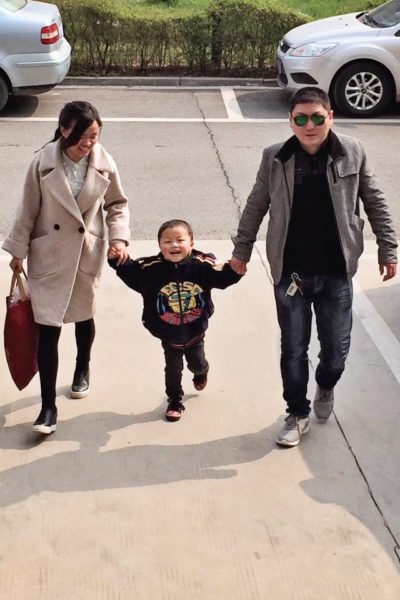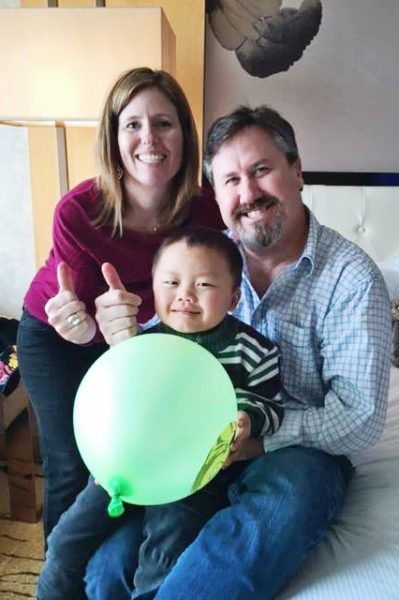One and a half years ago my husband and I, seasoned parents with three pre-teen/teenage biological daughters, flew across the globe to China to meet our four-year-old son, Asher. He was in the Special Focus program and his special need was Developmental Delay. Being that DD is such a common and global term associated with many Special Focus children, having limited information in his file, and getting almost nothing out of his “updates,” it was extremely hard to grasp where our son was developmentally compared with his same-age peers.
And speaking of same age peers, even this had zero clarity. When we were matched with Asher, he was listed as being a month shy of four; he did not act like an almost four-year-old in the videos nor look like one in his pictures, which left me questioning his DD label. I wondered if he truly had delays or if it simply appeared that way because the orphanage workers had overestimated his age. He was abandoned without any identifying information so the day he arrived at the orphanage became his “birthday” and the year of his birth was a best estimate.
With no way to explore this until we brought him home, I put these questions aside and started daydreaming about how this little guy would adjust to all of the whirlwind changes in his life —his living conditions, his caretakers, his language, his diet, his friends, his culture — would all change once we entered his life.
We had only received a handful of short videos of him but they were enough to fill me with a sense of peace about his personality. He seemed cheerful, eager to please and made great eye contact with the person behind the camera. I felt optimistic that he would most likely transition well, although I prepared myself by reading books on attachment and grieving in the event I was deluding myself (or he was just making a great show for the camera!).

Thankfully, my gut feeling was right. This little guy walked into the Civil Affairs office as if he was the Chief Officer! He was holding hands with his Orphanage Director and driver, beaming from ear-to-ear, as if he couldn’t wait to see where this adventure would take him. Of course, having armed myself with how grief and issues with attachment don’t always appear immediately, I was a little concerned about whether the newness and anticipation would wear off and, if it did, how this seemingly happy-go-lucky guy would handle it when the tide of grief and loss swept away the waves of excitement.
It still amazes me how swift the hand-off is after traipsing through the seemingly never-ending molasses-filled swamp of paperwork and approvals in order to make it to the long-awaited day.
After greeting us and introducing us to our new son, the Orphanage Director gave us a sly smile and imparted five words of wisdom about our son — “He’s a little bit naughty” — before leaving us to navigate our uncharted waters and learn all we could about this adorable little guy who had been entrusted to us.
Well, upon meeting this “little bit naughty” boy I was struck by two things: an indescribable feeling of fulfillment (after praying for, and not so patiently waiting to kiss and hold him, he was in my arms!) and the strong sense that our son’s age had been misjudged. Although he was tall and around the height of an average five-year-old, his small hands and feet, chubby cheeks and unsteady gait appeared to be more like a late three to young four-year-old.
Thankfully, our son’s happy and bubbly personality remained consistent throughout our time in China and we were thrilled with how he was bonding with us. Our biggest challenge was keeping this little Houdini safe. He wanted to explore everything and had no sense of fear or understanding of safety. He also was very unsteady (more so than a typical three or four-year-old), falling often and constantly bumping into things.

Of course his impulsivity and hyperactivity raised a big red flag with the letters ADHD on it. One of our biological daughters has ADHD and I am a self-proclaimed ADHD spotter after having worked with many kids with this diagnosis as an Elementary School Counselor, so I felt like I had an idea of the impetus behind this fast-handed Speedy Gonzales. But, I also knew from the books I read during our adoption journey that “orphanage behaviors” can mimic ADHD. I decided to put this concern on the back burner for a year, thinking surely a year or so would give him time to explore his surroundings and develop the ability to be cautious around cars, heights, sharp objects, etc.
We are now at the year-and-a-half mark from when we brought Asher home to America. He has gotten glasses, which has cut back on the number of times he trips or runs into walls, but he still falls more than your average five-year-old. We legally changed his birthdate and it is no longer the day he arrived at the orphanage (what a horrible birthdate for a child to have!). His birthday is now the day we were blessed to meet him.
He had a dental exam which put his age range significantly lower than the one assigned by the orphanage so we changed his birth year as well. He was estimated to be ten months younger than the orphanage believed him to be. This helped “bridge the gap” between his skills and typical peers his age but there is still a noticeable gap, especially socially, which is extremely common in children from orphanages.
His impulsivity and hyperactivity have gotten better, although it is still high compared to his same age peers. He has trouble with fidgeting, sitting still, and concentrating. He often has struggles with staying on task but has certain areas he excels in; he has learned 36 sight words since beginning kindergarten this year and can do simple addition and subtraction. He is in a Comprehensive Development Class (with an hour and a half inclusion in a regular education class) in a public school and has an IEP for his Developmental Delay.
Shortly after Asher started kindergarten, my husband and I made the choice to try an ADHD medication to help him focus. We feared him getting even further behind as we got more and more reports of him “scurrying on the floor like an ant” during circle time or roaming off during instructional time. We, and the teachers, saw no change in his impulsivity or focus while on the medication. We then tried another one and then another one, with the same lack of effect.
This is when I began to question my gut feeling. Is this really ADHD? All the kids I know who have tried the ADHD meds we tried with Asher showed an almost immediate effect. If it’s not ADHD, what is it?
I began to do research and came across articles about Sensory Integration Disorder (previously labeled SPD), a disorder caused by the retention of one or more primitive reflexes. Primitive reflexes are the first part of the brain to develop and should only remain active for the first few months of life.
It is believed that infant reflexes that don’t integrate successfully can lead to developmental delay. The causes of retained primitive reflexes can be a traumatic birth experience, prematurity, falls, trauma, lack of tummy time, delayed or skipped creeping or crawling, chronic ear infections, and abnormal vertebrae. Children who have been adopted are at an increased risk for sensory problems; children adopted from overseas orphanages are at a significantly higher risk.
From the information I have gathered, there are eight retained primitive reflexes. When I read the symptoms of the retention of one primitive reflex in particular, the Spinal Galant Reflex, I had a lightbulb moment. It can cause difficulty sitting still, poor concentration, bedwetting and/or poor bladder control, clumsiness, irritation with tags on clothing, lack of focus and attention to a task, fidgeting, trouble with short term memory and frequently making noise (buzzing or humming). Asher could be the poster child for the retention of this primitive reflex.
Since this discovery, Asher has had an evaluation with an Occupational Therapist and receives weekly therapy in addition to what he receives at school. His OT believes he skipped the crawling stage which does not surprise me as, although we do not have any information about his two years of life prior to the two years he lived in the orphanage, his head is misshapen, which often occurs with babies prior to age two who have spent an extended period of time laying in a crib or on a pallet.
The diagnosis or label of Developmental Delay can be bewildering since it encompasses such a broad spectrum of impairments. In my opinion, it is also overused in international adoption files. Unless a child has spent a limited time in an orphanage and came from an environment filled with enrichment activities and attentive adults, how could they not be delayed?
With many adopted children starting their new life at such a disadvantage, I am encouraged to read that sensory challenges can be overcome with appropriate interventions and time. I have seen much growth in this area in the year and a half Asher has been with us.

Our child (who shimmied up the lattice in our hotel room in China in the one minute it took me to brush my teeth in the adjoining bathroom) just the other night walked into a restaurant with an un-manned laptop (buttons are his favorite!) and restrained himself from touching the keyboard by putting his hands behind his back, without any prompting from us. He is learning to self-inhibit.
If any of the symptoms of Sensory Integration Disorder ring true to your child, or if you suspect ADHD, I encourage you to seek out an evaluation with an OT. With proper diagnosis and therapy, it is my hope that you too can dissect the generic DD diagnosis and hone in on an accurate diagnosis.
It is my prayer that health care professions, school staff and the general public become more aware of the prevalence of sensory disorders. At a time when many are shocked by, or doubting the validity of, the massive number of children diagnosed with ADHD, it is important that SID receive more attention.
It makes me wonder how many children have been misdiagnosed with ADHD and are taking medication and suffering from side effects unnecessarily?
How many parents are not seeing improvement with medication but are not being educated about the similarity between ADHD and sensory disorders?
How many kids are labeled “naughty” or “wild” when, with focused therapy and time, these frustrating behaviors can be extinguished or diminished?
I suspect a lot.
– guest post by Elizabeth

























Thank you so much for this post. We are 6 months home and after meeting with our first speech therapist this week, I felt very concerned that my son has ADHD. His symptoms and story are very similar to Asher’s. I am definitely going to look into this some more and reach out to an OT. Thanks again!
Thank you for this article. Food for thought as we seek guidance from a therapist.